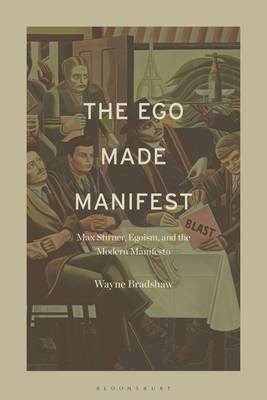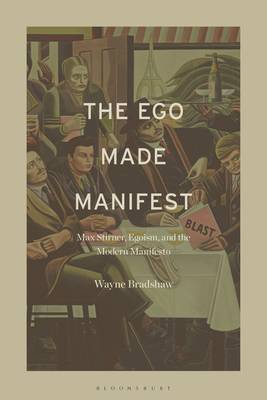
- Retrait gratuit dans votre magasin Club
- 7.000.000 titres dans notre catalogue
- Payer en toute sécurité
- Toujours un magasin près de chez vous
- Retrait gratuit dans votre magasin Club
- 7.000.0000 titres dans notre catalogue
- Payer en toute sécurité
- Toujours un magasin près de chez vous
The Ego Made Manifest
Max Stirner, Egoism, and the Modern Manifesto
Wayne Bradshaw
Livre relié | Anglais
203,95 €
+ 407 points
Description
From Karl Marx to Wyndham Lewis, this book examines Max Stirner's influence on the modern manifesto.
Max Stirner has long proven to be an elusive figure at the fringes of 19th-century German idealism. He has been portrayed as the father of the philosophical dead end that was egoistic anarchism: a withered branch of an ineffectual movement, remembered largely because of its suggestion that crime was a valid form of revolutionary action. From this perspective, egoists subscribed to extreme forms of anarchism and defended acts of theft, assault, and even murder; egoism only held lasting appeal to rebels, nihilists, and criminals; and Stirner's ideas could - and should - be consigned to the dustbin of history accordingly. The Ego Made Manifest argues that many of the accepted truisms about Stirner and his reception are false and that his contribution to modernist and avant-garde manifesto-writing traditions has been overlooked. Beginning with his influence on Marx's Communist Manifesto, Wayne Bradshaw reinserts Stirner into the history of manifestos that not only rebelled against tradition but sought to take ownership of history, culture, and people's minds. This study documents the trajectory of Stirner's reception from mid-19th-century Germany to his rediscovery by German and American readers almost 50 years later, and from his popularity among manifesto writers in fin de siècle Paris to the birth of Italian Futurism. Finally, it considers how American and British interest in egoism helped inspire Vorticism's satirical approach to revolt, and how, in an age of extremism, Stirner's ideas continue to haunt the modern mind.Spécifications
Parties prenantes
- Auteur(s) :
- Editeur:
Contenu
- Nombre de pages :
- 224
- Langue:
- Anglais
Caractéristiques
- EAN:
- 9798765102565
- Date de parution :
- 05-10-23
- Format:
- Livre relié
- Format numérique:
- Genaaid
- Dimensions :
- 152 mm x 229 mm
- Poids :
- 462 g

Les avis
Nous publions uniquement les avis qui respectent les conditions requises. Consultez nos conditions pour les avis.






